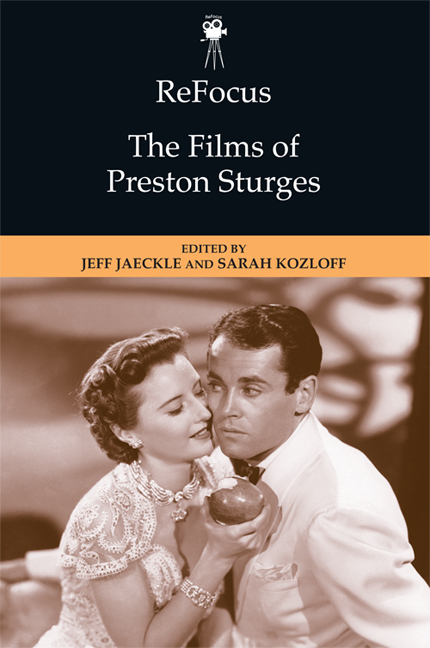Book contents
- Frontmatter
- Contents
- List of Figures
- Notes on Contributors
- Introduction: An Agile Mind—The Many Stands of Preston Sturges
- Part 1 Contexts: Genre, Studio, Authorship
- Part 2 Cultural Commentary: History and Identity
- 5 Sturges's Many Mothers
- 6 “These Are Troublous Times”: Social Class in the Comedies of Preston Sturges
- 7 “They Always Get the Best of You Somehow”: Preston Sturges in Black and White
- 8 Falling Hard: The Sin of Harold Diddlebock
- Part 3 Technique: Scripting, Performance, Music
- Part 4 Impact: Reception/Reputation
- Index
5 - Sturges's Many Mothers
from Part 2 - Cultural Commentary: History and Identity
Published online by Cambridge University Press: 05 September 2016
- Frontmatter
- Contents
- List of Figures
- Notes on Contributors
- Introduction: An Agile Mind—The Many Stands of Preston Sturges
- Part 1 Contexts: Genre, Studio, Authorship
- Part 2 Cultural Commentary: History and Identity
- 5 Sturges's Many Mothers
- 6 “These Are Troublous Times”: Social Class in the Comedies of Preston Sturges
- 7 “They Always Get the Best of You Somehow”: Preston Sturges in Black and White
- 8 Falling Hard: The Sin of Harold Diddlebock
- Part 3 Technique: Scripting, Performance, Music
- Part 4 Impact: Reception/Reputation
- Index
Summary
Perhaps the first notable feature of the mothers in Preston Sturges's films is that they exist at all. After all, Hollywood comedies, and specifically screwball comedies, are full of aunts, sisters, dowagers, and guardians—but very few mothers. Especially scarce are the mothers of female leads. As Stanley Cavell has noted, “in the fiction of our films the woman's mother is conspicuously and problematically absent.” Indeed, mothers are scarce in screwball comedies, not just in the remarriage comedies that Cavell describes, but also in most romantic comedies of the period. Whereas mother–daughter relationships are a staple of Hollywood melodramas, comedies tend to avoid those potentially problematic relationships. When Hildy tells Walter that “mother” will accompany her and Bruce on their honeymoon in His Girl Friday, Walter assumes she is referring to her own mother and responds incredulously: “Mother? Why, your mother kicked the bucket!”
Mothers of male leads in classical Hollywood comedies don't get much more attention. One clue to Dan Leeson's unsuitability to be Lucy Warriner's new husband in The Awful Truth is his possession of and relationship to a mother, an impression he confirms as their relationship is ending: “Well, I guess a man's best friend is his mother.” Whereas fathers are well-represented in Hollywood comedies, most often as senex figures who constitute obstacles the male lead must overcome to win the young woman of his choice, the diegetic world of comedies has little room for mothers—except in the works of Preston Sturges.
In films either written or written and directed by Sturges, mothers are not only present but also, in fact, integral to the development of the narrative; they exhibit a powerful influence over their worlds in both his dramas and his comedies. Because Sturges has often been lauded for his progressive, protofeminist approach to gender construction, we should consider his take on motherhood, a topic he addressed repeatedly in his films.
Sturges's construction of motherhood is both complex and nuanced. As his career in Hollywood progressed, his conception of motherhood, as seen in his films, changed. Perhaps as a working out of his complex relationship with his own mother, the mothers in Sturges's early films are cold and manipulative (The Power and the Glory, Lee's mother in Remember the Night).
- Type
- Chapter
- Information
- ReFocus: The Films of Preston Sturges , pp. 109 - 132Publisher: Edinburgh University PressPrint publication year: 2015



